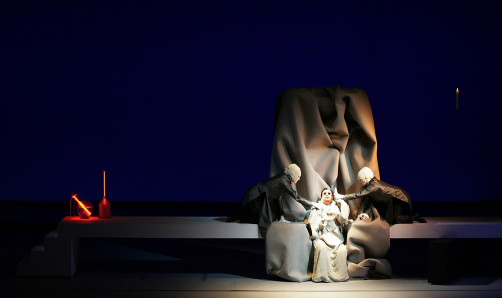
Faust the opera, set design Rolf Sachs, Staatstheatre Wiesbaden 2007
“Autistic barriers are erected in order to avoid the pain linked to the traumatic awareness of the gap between self and object. They would appear to involve an overly-narcissistic relationship between the infant and one or other of the parents, a relationship based on the illusion of continuity.”
Prof. Didier Houzel
“Frances Tustin’s (1986) description of autistic barriers took this a step further.
She showed that the autistic manoeuvres which are triggered in order to counter
the experience of the intolerable gap between self and other not only highlight the
traumatic trace of primitive experiences that have not been transformed but also
create an obstacle to any new attempt at transformation and symbolization.”
Prof. Didier Houzel
“The US military operation in Fallujah, largely justified on the claim that Zarqawi’s militant forces had occupied the city, used white phosphorous, cluster bombs, and indiscriminate air strikes to pulverise 36,000 of Fallujah’s 50,000 homes, killing nearly a thousand civilians, terrorising 300,000 inhabitants to flee, and culminating in a disproportionate increase in birth defects, cancer and infant mortality due to the devastating environmental consequences of the war.
To this day, Fallujah has suffered from being largely cut-off from wider Iraq, its infrastructure largely unworkable with water and sewage systems still in disrepair, and its citizens subject to sectarian discrimination and persecution by Iraqi government backed Shi’a militia and police. “Thousands of bereaved and homeless Falluja families have a new reason to hate the US and its allies,” observed The Guardian in 2005. Thus, did the US occupation plant the seeds from which Zarqawi’s legacy would coalesce into the Frankenstein monster that calls itself “the Islamic State.”
Nafeez Ahmed
“We are unknown to ourselves, we gentlemen of knowledge”
Nietzsche
On this week of the anniversary of 9/11, the U.S. nine eleven that is, there remains the reflexive bathos of the official media for the state, meaning all corporate mainstream media. It is automatic and seems to almost intensify as Obama and the Pentagon and Joint Chiefs draw up plans for what is essentially a permanent state of war.
The average American, whatever that is, so lets say huge chunks of the U.S. citizenry, cannot begin to imagine what life is like for the average Iraqi. Imagine if instead of three thousand dead, there were several million dead. Over a third of New York City lets say. Imagine homes from Battery Park to Washington Heights, from Long Island City to Long Island itself in rubble, radioactive rubble. Imagine only limited electricity, and water. And imagine most of all an occupying army of foreigners. An army with a green zone in central park, taking up the entire park and serving Pizza Hut deep dish pizza and Starbuck frappacinos, and with a bowling alley and video games. And you, the average New Yorker, having no access to any of that but instead being subject to constant random searches and detention. Imagine your libraries and museums destroyed. The New York Public library gutted, and the Modern looted. That is life for the average Iraqi today.
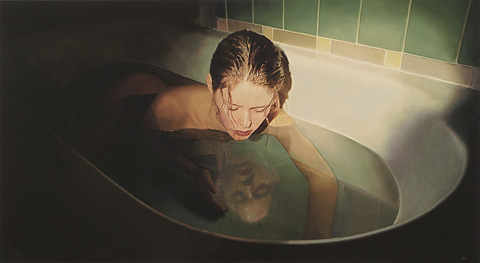
Robert Standish
In one sense, this resembles life for the very poorest communities in the U.S. already. The black and brown communities have a de-facto occupying army in the form of the domestic police force. A police now militarized and openly discriminatory. A police force who can do whatever they want. A police force of almost total impunity.
The U.S. empire however is one in which conquest means fragmentation. I keep using the word destablize, and that’s because U.S. foreign policy intentionally looks to do exactly that. It works well for the eventual reconstruction projects of Halliburton, Carlyse, et al.
“Contemporary US intervention does not seek to secure and take over the existing military and civilian state apparatus; instead the invaders fragment the conquered state, decimate its cadres, professionals and experts at all levels, thus providing an entry for the most retrograde ethno-religious, regional, tribal and clan leaders to engage in intra-ethnic, sectarian wars against each other, in other words – chaos. Even the Nazis, in their expansion phase, chose to rule through local collaborator elites and maintained established administrative structures at all levels.”
James Petras
The U.S. since Reagan, has intensified its saturation bombing, its shock and awe, and it’s wholesale destruction. This is a campaign of creating failed states. Its not Empire building. It’s control certainly, but it’s a peculiar 21st century logic predicated on failure, on control of the global masses by way of control of limited resources. It is designed to build states of permanent scarcity.
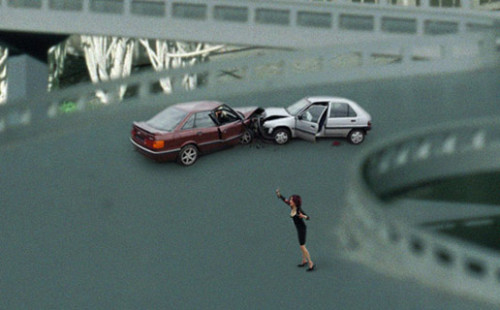
Xing Danwen
I was thinking also of the solidifying of this idea, a cultural position, of “knowing yourself”. It’s almost a religion today in the West. In particular though in the U.S. I knew this young woman once who always was judging people according to how much, in her opinion, ‘they had worked on themselves’. I think this is a fairly common notion. This woman went to every group available; children of alcoholic parents, survivors of physical abuse, various 12 step meetings, and a shrink. There were probably a half dozen others I cant remember. She was herself close to totally dysfunctional. But she had graduated from an Ivy League university, and imagined herself a writer. She couldn’t write, but did have a sort of preternatural sense of what the next niche market in publishing might be. But, the bedrock stance of such people is the idea of a self you can sculpt, like a lump of clay, into a “person”, an identity, a high functioning adult member of society. And the way that you sculpt, that you ‘work on yourself’, is by various therapies, and self improvement schemes, based usually on surface self affirmation, but which is almost always self training in how to fit in. How to adjust. This is what is behind the idea of ‘making your life work’. And the best working life is the one with the largest bank account. That is the baseline.

David Hepher, Hoxton Gallery.
Now, it occurred to me this week that the image of the theatre is actually still the prevailing model for the narration of our lives. The actual medium of the theatre, of drama, of playwriting, is waning, and maybe at its lowest ebb in a couple thousand years; but that idea of a stage remains. In a sense we perform our role, on the stage in our mind. And we have also, an off stage and a green room (a dressing and preparation area). We rehearse our lines, our role, and it’s tried out in small ways, in our own version of a bus and truck tour of the provinces, until it’s determined to be ready for one or another opening night.
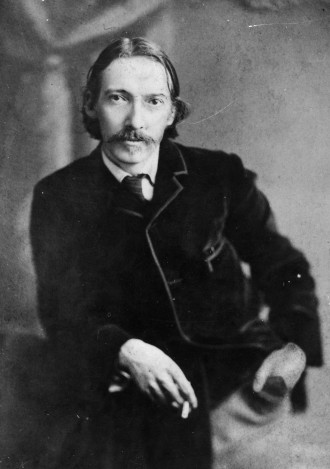
Robert Louis Stevenson, circa 1880.
There is a theme emerging in mass culture these days that might be described as ‘dead inside’. It is Zombie existentialism in a sense. I wrote last posting about HBO’s The Leftovers, which in one way was a Christian tinged ‘dead inside’ trope. This hues very close to the post apocalyptic genre, one that includes everything from the original Mad Max (a film oddly pervasive in its influence) to Night of the Living Dead, up through BBCs The Survivors, or Danny Boyle’s 28 Days. There seems a split though; because the post apoco-genre usually pits the survivor community against the attacking hordes. The Walking Dead on AMC now is a good example. The other though, more interesting sub branching is the everyone is already dead idea. The Leftovers was the Christian version, and these seem to foster the trend toward ‘return’ from the dead themes (The very good French series The Returned) and Resurrection. One has to see this I think in terms relating to crime narratives, and the rise of the Knight Errant as PI, the Sam Spade urban man of integrity, because the search there was for truth. Sam Spade or Phillip Marlow have become Rust Cohle. From Knight Errant to internal zombie. One of the failures, and perhaps really the only failure, of True Detective was in the final two episodes. The heart of darkness, that which has rendered our inner lives dead, cannot be made literal. And it was. The heart of darkness is not a creepy old guy with a shotgun. Same as the final episode tended toward (not completely, mind you) a redemptive optimism. Rust was a complex ‘true’ detective, in that he was looking for ways to fill his own void, his personal lack. But the existential zombie, the dead-inside idea seems increasingly in the Zeitgeist.
There are two things going on with this; one is an adult population now mimicking the autistic processing of information and stimulus. And there are now at least four shows (including the new Chasing Shadows, a UK crime show) with Asperger’s sufferers as primary characters. Obsessive and hyper focused, as in The Bridge, and in Chasing Shadows, they actually are the perfect compliment to the puzzle solving put before them. The other trend is the emptiness of the everyday. My experience, anecdotal, with Aperger’s sufferer’s is that they cant wait to tell you about their condition. There is some sort of pride in this condition, and a sense of actually having superior powers of analysis. In a sense, in the most instrumental world of the 21st century, they probably are an adaptive evolutionary stage. But therein lies the problem. The instrumental. I had an self proclaimed Aspergerite tell me the other day that neurotypicals (sic) are ‘so slow’.

Claerwen James
It’s worth mentioning again how World War Z included Arab/Palestinians as marauding infectious zombie-ish invaders, ripe for extermination. No safeguard is harsh enough. The Last Ship this season was a curious cartoon recruitment film for the Navy, but it did feature this idea of survivor vs. foreigner. And as seems often the case, the survivor community is in some way ‘special’, or elite. This is the general given. The studios and networks, Im’ not sure, realize just what overdetermination is occurring within these sub genre formulations. But my point here is the dead inside philosophical pseudo zombie is now a prototype. The Existential Zombie. For it links up with this ‘working on yourself’ idea. The sense of societal malaise that seems to be driving stuff like The Leftovers and Resurrection, or even period poaching like Penny Dreadful, are suggesting some search for redemption. True Detective to its credit did not search for redemption. Well, not per se. The literary ancestors probably include the much neglected Robert Louis Stevenson novel (his last) The Ebb Tide.
Allow me a somewhat long expert from the opening page:
“Throughout the island world of the Pacific, scattered men of many European races and from almost every grade of society carry activity and disseminate disease. Some prosper, some vegetate. Some have mounted the steps of thrones and owned islands and navies. Others again must marry for a livelihood; a strapping, merry, chocolate-coloured dame supports them in sheer idleness; and, dressed like natives, but still retaining some foreign element of gait or attitude, still perhaps with some relic (such as a single eye-glass) of the officer and gentleman, they sprawl in palm-leaf verandahs and entertain an island audience with memoirs of the music-hall. And there are still others, less pliable, less capable, less fortunate, perhaps less base, who continue, even in these isles of plenty, to lack bread.
At the far end of the town of Papeete, three such men were seated on the beach under a purao tree.
It was late. Long ago the band had broken up and marched musically home, a motley troop of men and women, merchant clerks and navy officers, dancing in its wake, arms about waist and crowned with garlands. Long ago darkness and silence had gone from house to house about the tiny pagan city. Only the street lamps shone on, making a glow-worm halo in the umbrageous alleys or drawing a tremulous image on the waters of the port. A sound of snoring ran among the piles of lumber by the Government pier. It was wafted ashore from the graceful clipper-bottomed schooners, where they lay moored close in like dinghies, and their crews were stretched upon the deck under the open sky or huddled in a rude tent amidst the disorder of merchandise.
But the men under the purao had no thought of sleep. The same temperature in England would have passed without remark in summer; but it was bitter cold for the South Seas. Inanimate nature knew it, and the bottle of cocoanut oil stood frozen in every bird-cage house about the island; and the men knew it, and shivered. They wore flimsy cotton clothes, the same they had sweated in by day and run the gauntlet of the tropic showers; and to complete their evil case, they had no breakfast to mention, less dinner, and no supper at all.
In the telling South Sea phrase, these three men were ON THE BEACH. … Not long before, a ship from Peru had brought an influenza, and it now raged in the island, and particularly in Papeete. From all round the purao arose and fell a dismal sound of men coughing, and strangling as they coughed. The sick natives, with the islander’s impatience of a touch of fever, had crawled from their houses to be cool and, squatting on the shore or on the beached canoes, painfully expected the new day. Even as the crowing of cocks goes about the country in the night from farm to farm, accesses of coughing arose, and spread, and died in the distance, and sprang up again.”
It is one of the masterpieces of 19th century writing, and keenly appreciated by some (Nabokov for one) but mostly consigned to the oblivion of being the pessimistic adult work of a beloved writer of children’s stories. The image of dawn on the South Sea beaches of an island riddled with influenza and the sound of coughing, is indelible. Also, that Stevenson wrote as perfect an English prose as one might ever find. But it is a story of outcasts, of the ‘dead inside’, the man without meaning.
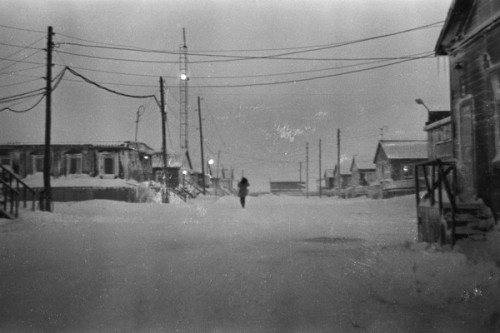
Emile Hyperion Dubuisson, photography. ‘Siberia’.
But let me bring this back to this idea of our interior thinking being a kind of theatre. This is not an original idea, obviously, for the internal theatre, the one in our heads, is a very old idea. I think there is some primordial spatial, structural impulse that ends in the creation of a performance space; a stage. I don’t know if cavemen acted out their inner lives, or gave instruction that was linked to ideas of their own identity, or if they just saw everything as a collective. But clearly I think there is a natural linkage between groups, our interior thoughts, and a stage.
I think all great writing takes place on, or presumes, some kind of stage. Perhaps something becomes a stage when a performance takes place on it. But defining a performance is as impossible as defining a stage. Here is where allegory needs to be introduced and discussed. Benjamin’s The Origin of German Tragic Drama (Der Ursprung des Deutschen Trauspiels) was on one level, probably the most important level, about allegory. It was also because of Benjamin’s prose, an allegory itself. It is a highly discomforting book. I read it the first time when I was in my early twenties. When I re-read it (the first re reading) I was forty and it seemed a very different book. Benjamin had a complicated almost mystical set of ideas about language. One cannot read him and not start to contemplate the very idea of alphabet formation, of oral histories, and of symbol. For Benjmain, symbol is not greatly different than allegory. But it is in allegory that Benjamin saw the fable of mankind, of knowledge, of identity. And that there was something unconscious in all language and all symbol. And that it was, as I wrote a couple postings back, a sort of surplus unconscious, a by-product of all writing. For now, though, this matters because it is related to the idea of a stage on which each individual acts out his or her personal drama. A drama that is, however, shaped by history.
Calasso, a perceptive analyst of Benjamin, quotes Kafka:
“The leopards break into the temple and empty the sacrificial vessels, this is repeated time and again; in the end it can be foreseen and becomes part of the ceremony.”
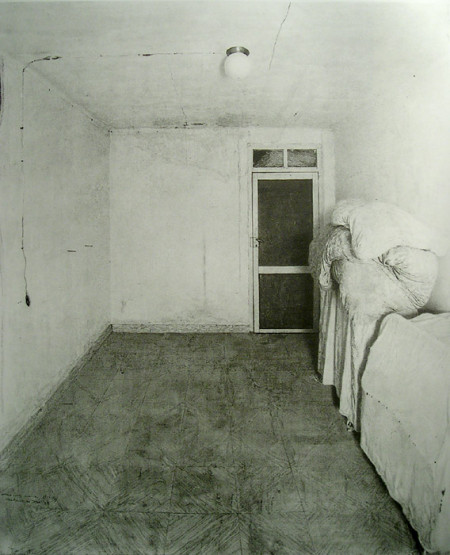
Antonio Lopez Garcia
In a very real sense the rise of global capitalism, and with it, now, a resurgent fascism, is erasing allegory. The fetish of the ‘self’ has meant that the self has no stage, that space is totalized or essentialized, or however one chooses to describe it and that it rejects narratives of any complexity. But it also has created a backed up unconscious stream that is spilling into public discourse as a kind of violence. The master narrative is not only one that valorizes empire and white supremacism, but it is one inextricably tied to the new manufactured reality of electronic mass media. There are other implications, for example the political economy and class bias of dyslexia research: http://monthlyreview.org/2014/09/01/the-political-economy-of-dyslexia/
Let me quote from Strauss’ essay:
“The medicalizers have no explanation for a whole range of established facts about real reading. Here is one: proficient reading is not a process of accurate word identification. How do we know this? From observing and analyzing real reading. Real readers who are proficient at reading for meaning do not look at fully one-third of the words on a page. Real reading is not pronouncing words presented individually on flash cards; this is not a communicative event. Real reading means reading authentic text—language generated by an author with the intention of conveying meaning. Only in such cases is the reader’s goal as it should be: to make sense of the print. And making sense of the print now includes taking into account that the text was composed by a human agent who composed the text purposefully. What is this author trying to say? That is a communicative event.”
and a bit later…
“So all the brain imaging research, genetic research, and pathology research on reading is fundamentally irrelevant, because it is generated by and interpreted within an unsalvageable theory of reading. All the proposals about how we need to drill kids hour after hour on letter-sound relationships are entirely counterproductive, because they take the focus off meaning.
So why is this preposterous pseudoscience in the media, in the classroom, and in the laws passed by Congress? What is the big difference between medicalized reading and the alternative? “The big difference, the one that really matters, is this: the ideas and opinions of the medicalizers are in power; the ideas and opinions of their opponents are not in power. And, to paraphrase Karl Marx, the ruling ideas of society—the ideas that are in power—are the ideas propagated and promoted by the ruling class.”
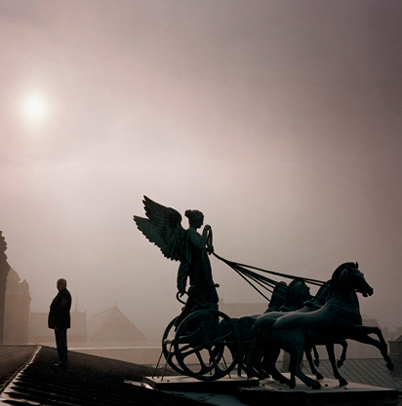
Trine Sondergaard, photography.
This is relevant to the ways in which allegory is being removed by insisting on an instrumental reading. This also diminishes mimetic engagement with narrative. So on the one hand is a culture of self-help, of therapy (though not the traditional Freudian or psychoanalytic kind, because that, as I continue to read EVERYWHERE, is out of date and old fashioned), and of self improvement as an ideal. Americans have always been about self improvement, however. But more on that in a second, and on the other hand we have a society that trains its youth in the absolute most instrumental and mechanical ways for the most instrumental and mechanical ends, and one that also enforces a master narrative of conquest and white superiority. In one way its a society of twelve step colonialists. And across this runs what I think is a subtle adaptive impulse, one that has at times anomalous by products. People are less and less able to process complex narrative. They seem less and less able to integrate into coherent wholes the sum of the parts of their daily lives. And most clearly, things like allegory are soon going to be the vestigial tail stumps of human reasoning. But there is also, attached to loss of allegory, the deeper wound of a removing of the personal stage on which to process the world via a mimetic re-assemblage of stimuli and story.
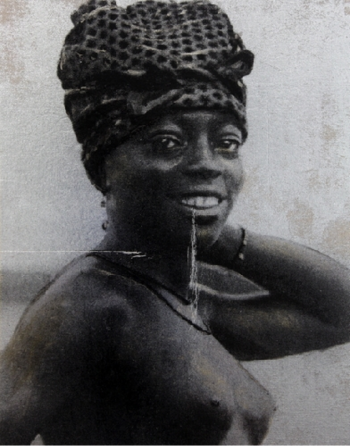
Brook Andrew, mixed media. ‘Dakar’, from original postcard.
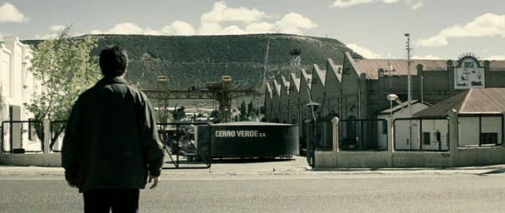
El Aura (2005), Fabien Bielinksy, dr.
In Divergent, the girl heroine (resembling most of the time a Southern Cali high school prom queen, and always with freshly blow dried hair) is part of a Brave New World of total conformity, and one without real sexual urges. Divergent seems, actually, to be almost entirely about the state and its rulings on reproduction and sexual activity. But it never rises to even the level of a discussion about ‘desire’. Now, ok, this is a movie (I hope) meant for teenagers, no doubt girls, as there just isn’t enough actual violence to cater to boys. Also its about girl ’empowerment’, meaning these days learning martial arts. Both are sub literate exercises in stupidity. So stunningly awful that one does wonder what is going on in the brains of the people involved. Jeff Bridges, Meryl Streep et al. The point is that neither has any potential to serve as allegory. There is no elsewhere. There is no there there in fact. There is only references to earlier film and photography. The amusing part of The Giver is that all knowledge is kept in a library of old books, and its all very Harry Potter and the library mostly resembles an old British gentlemen’s club. The signifiers for knowledge is colonial nostalgia.
A final note on an Argentine film from 2005. I only saw it this week. El Aura (Fabien Bielinsky dr.) is a story of an introverted epileptic taxidermist who day dreams of the perfect crime, and then takes a hunting vacation in Pategonia where he stumbles into a real crime. If that isn’t a pitch that open doors for you in Hollywood I dont know what it is. It stars Ricardo Darin, and apparently there is a law in Argentina that you cannot make a movie without Ricardo Darin. Still, this solemn and slowly developing story, set against the stark Patagonian landscape, has a certain disturbing quality — it reminded me a bit of The Hunter(2011), (a much better film finally) in that the real story is the one that cannot be told, because we as a society, have forgotten it. And nature is now something hard for many to even conceptualize. In this, the bloodless inert taxidermist is not an anti hero, but an irritating confused moralist who causes endless amounts of pain for those around him because of his incapacity to act. Clever but souless, the final image is one of accusation. Had the writing been better, only slightly, and the criminals more than cardboard, this might have been a great film. As it is, there is still a strangely haunting quality to it.
I post two paintings by David Hepher. Hepher is a quasi photo realist, although not exactly, and mostly paints the facades of council flats and tower blocks. The endless repetition of same is disturbing, and their scale somehow resists ever quite grasping what one is looking at. The brutal architecture is juxtaposed to the meticulous detailed painting of it, and in each same block is revealed difference, but a difference mostly of wear. The rain stained cement, the worn dirty curtains, the assaultive greys create talismans of a sort. Some of his earlier work was more illustrative (like below) but still effective, and others more abstract and somehow less effective for it. It is the neutral eye, or the appearance of it, that provides the power in his best work. They are insescapable somehow. Also interesting to compare to John Riddy’s photos of the same subject, or Rux Blee Luxemburg’s or Michael Wolf. Or the paintings of Driss Ouadahi.

David Hepher
Hepher may not be a major artist, but I think the integrity of his vision is worth applauding. It does raise questions however in terms of what the viewer is taking away from such paintings. It is partly an investigation of the trivia of modern life. In this way not unlike what Adorno focused on after he came to Los Angeles in 1944. For in trivia is to be found something closer (even if satirized)to the primal impulse of all culture. Here is the stage for historical memory.
Roberto Calasso suggests the truth of myth, that looking around us we find ourselves in our own myth. And that we recognize, therefore, the familiarity of all myths. This is only another way of saying that all the world’s a stage. And that nature, however it is analysed scientifically, remains terrifying. Our inner lives practice the mimetic narrating of our own myths. This is not the established kitsch and bathos of 9/11 memorials, but the terror that resides in a subtle recognition of history as it appears in those grey hostile tower blocks, and in all the rest of the detritus of modern daily life.

John Riddy, photography.

After reading this, as well as your reply to my comment on your previous post, a few things dawned on me. The antithesis of “deep memory” is “shallow memory”, which you discuss here. And since we live in a mainly visual culture the largest means of distributing propaganda is via movies/pictures. Pictures can be manipulated and taken out of context (my recent favorite being Fox News showing supposed union “thugs” getting ugly in Madison in ’11, except that there were palm trees in the background of the footage Fox used. Hence, the reason for some protestors carrying inflatable palm trees while circling the capitol building). Films can be much more subtle in their use of propaganda or just plain insipid. I think the latter applies more now than the former. I’ve also been reading Marshall McLuhan’s Understanding Media; he was very prescient in the use of media on perception.
The main idea I’ve been contemplating and which applies here (I think) is how empire is erasing history (“deep memory”) via war (which fragments close-knit societies) and is replacing it with a different one (“shallow memory”) where societies have been atomized and now fight one another. Worse yet is empire’s knowledge that traditional cultures are the last bastion of Community. Our ancestors were communists in that they lived communally and shared everything. I understand this from having studied economics and anthropology. I know it better from having lived it in rural West Africa. When I first arrived there I was amazed at how everyone lived on approximately the same level. There were no “wealthy” villagers. I later learned that once someone did earn a bit of money there were always 20 or 30 relatives that needed caring whether it was food, clothes, medicine, etc. in other words, the more one made the more obligations one had in terms of being responsible for others less fortunate. The Potlatch was redistribution on steroids. In a large city like Dakar, the example breaks down somewhat and there are lavish displays of wealth and great inequality. Yet there are always relatives that come knocking looking for help. Among the students at Cheikh Anta Diop University most would still eat communally in their dorm rooms and share what they had with whomever needed it.
This is what empire is trying to destroy: a different narrative that proves theirs to be hollow and exploitative. If empire can make people forget how to live communally or how to share and then replace it with the profit-motive where everyone is a potential opportunity to make a buck, then they will have won…This is their end-game, I believe. Destroy our past to create their future.
Thanks John. Here’s a pretty good piss-take on the movies you talk about: https://www.youtube.com/watch?v=9QOn064kKDI
John,
I’m glad you spoke about the final two episodes of True Detective because that’s where the show lost much of its mystery. You can’t have this exploration of the existential and then make the evil of the world so literal. It’s a betrayal of the narrative. That’s why Bolaño’s 2666 is such a powerful and haunting novel. The femicides are never solved. Not one. And as the Mexican detectives keep digging deeper and deeper into the crimes, they realize that the crimes reach deep down into the bowels of human wickedness. The killers, no matter the arrests, are always at large. This is where True Detective failed me. You can almost feel the hand of the HBO executive forcing this ending onto the show. Or maybe it was Pizzolatto’s failure of imagination. He just couldn’t look into the abyss. Bolaño not only stared into the abyss, he dove head first into it. So did Melville – hell, that’s all he wrote about. Rust Cohl looked into the abyss, but then he literalized it. And the moment he spoke those words at the end of the series and made them understood, their meaning dissipated. One isn’t supposed to understand. It’s a paradox.
Right Joe. One can solve the mystery of a murder, if mystery is even the word, and one solve cross word puzzles, but in Juan Rulfo too, or the best of the hard boiled writers and certainly in Highsmith, the discovery of who committed the crime never serves to unify any of the characters or the narrative itself. HBO cannot live with that degree of pessimism — they simply can’t. This is why melodrama and sentimentality are so inimical to great work, they serve as lies, they obfuscate the essential dilemma. Dostoyevsky is another example. One of the reasons I so liked Blue Caprice was that their arrest explained nothing, solved nothing. The killers were mysteries to themselves and to the police.
I have a feeling the ending might not be the doing of HBO, but Pizzolatto. I think what he was trying to go after here was a sort of pessimistic optimism — as he makes clear, the greater corruption in society, the rot down to the fabric of the society, was not solved; the sinister “sprawl” is still powerful and still at large; but, at least, two individuals were able to do what little they can and at least vanquish a tiny bit of evil. Hence Cohle’s final speech about the little specks of light against the background of darkness (I’ll call that the “nighttime monologue”).
And I agree with you, I think that’s absolutely a failure. But I think there’s a coherent reason why the ending might be within the writer’s original vision itself.
John,
I have long since lost track of you. Reading your post regarding authenticity of the inner workings of a mind; allegory vs no ability for solving real meaning; forays into a deficient culture leading to zombie existentialism and on…so impressed to read you and “find” you. i wasn’t actually ” looking” for you but there you were.
I played “Midge” in your play “Close” at Factory Place Theatre.
I recall the tangible expression of the characters of what you wrote and the allowance for dripping in my own textured internal pathos while playing Midge. Thank you. I had a good time
I am happy to read of your writing successes; well deserved.
And am sending good wishes to you,
Flo Lawrence